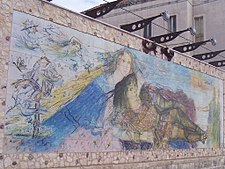Phalantos

Phalantos (also Phalanthos, Greek Φάλανθος ) was the son of the Spartan Aratos and leader of the Parthenians (" sons of virgins").
According to ancient authors, he is the founder of Taranto . Previously he is said to have founded Satyrion , about 13 km southeast of Taranto. The legends of the colonization of Tarento are extensively handed down by Pausanias and Strabo , who also quotes many earlier authors.
The Parthenians were illegitimate sons born during wartime and the absence of the army. As children out of wedlock, they did not have the same rights and were treated as outsiders.
End of the 8th century BC After a long war against the Messenians , the Parthenians organized a revolt together with the slaves and were led by Phalantos. They demanded from the nobles the rights they had been denied. But the uprising failed. Since the insurgents could not be sentenced to death like the slaves, they had to leave the city and look for new land. Before leaving, Phalantos asked the Oracle of Delphi , who, through the priestess, pronounced the following judgment: "If it will rain when the sky is clear, you will conquer new land and city."
When Phalantos drove on board on a long journey towards Japygien (today's Apulia) and saw his wife Aithra ("clear sky") crying, he said that the oracle had come true. So he founded his city and called it Satyrion. A bathing resort still exists today under the Italianized name Saturo, a few kilometers from Taranto.
Years later, the Spartan settlers moved to the future Taras . They saw better trading opportunities in the new city. The occupation of the area took place without great resistance from the local population, the Japygen, who were forced to flee to Brindisi . Phalantos himself was also expelled after a discussion with his fellow citizens; he found refuge with the Japygen, where he died and was also buried.
See also
swell
- Pausanias 10, 10, 6-10, 13, 10
- Marcus Iunianus Iustinus 3, 4
literature
- Hans von Geisau : Phalantos. In: The Little Pauly (KlP). Volume 4, Stuttgart 1972, column 697.